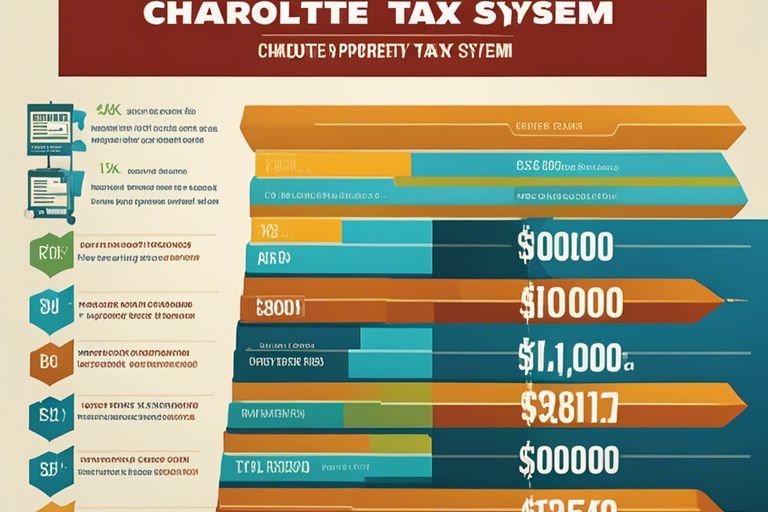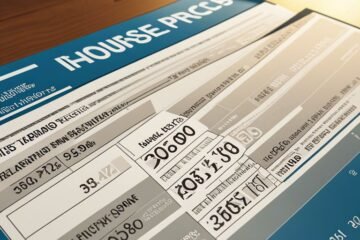There’s no escaping taxes in Charlotte, but don’t let them overwhelm you. Understanding the basics can help you navigate the world of taxes with ease. From property taxes to income taxes, this overview will break down what you need to know about taxes in the Queen City. So grab a cup of coffee, sit back, and let’s demystify the world of Charlotte taxes together.
Key Takeaways:
- Property taxes in Charlotte are based on the assessed value of the property as determined by the county’s tax assessor’s office.
- Charlotte has a local sales tax rate of 7.25%, with additional rates for Mecklenburg County and the Transit tax.
- Residents of Charlotte pay state income taxes at a rate of 5.25%, with additional local income taxes for Mecklenburg County.
Tax Basics
What are Taxes?
To start off, you may be wondering, what are taxes exactly? Well, taxes are compulsory financial charges imposed by the government on individuals or businesses to fund various public expenditures like infrastructure, education, healthcare, and more. Taxes are collected by the government to ensure the smooth functioning of society and provide imperative services to its citizens.
Why Do We Pay Taxes?
To understand why we pay taxes, you need to grasp that taxes play a crucial role in maintaining a functional society. When you pay taxes, you are contributing your share towards the development and upkeep of public services that benefit everyone. These services include but are not limited to roads, schools, police and fire departments, and social welfare programs.
This means that when you pay your taxes, you are imperatively investing in the betterment of your community and ensuring that imperative services are available to all. So, the next time you grumble about tax season, remember that your contribution is imperative for the functioning of society as a whole.
Charlotte Tax Rates
Sales Tax Rate
To start, assuming you are shopping in Charlotte, you will be subject to a sales tax rate that consists of state sales tax as well as Mecklenburg County sales tax. Currently, the combined rate stands at 7.25%, with the state imposing a 4.75% sales tax and the county tacking on an additional 2.5%.
Income Tax Rate
On the income tax front, Charlotte residents are fortunate to be located in North Carolina, a state that follows a flat income tax rate across all income brackets. As of now, everyone pays a 5.25% rate of income tax on their earned income, regardless of how much you make.
Rate: 5.25%
Property Tax Rate
To investigate into property taxes in Charlotte, you’ll find a more complex situation compared to sales and income taxes. The property tax rate in Mecklenburg County is set annually based on the appraised value of your property. The current rate hovers around 0.83% of your property’s assessed value.
Income: your tax obligations will vary based on the specific location of your property within Charlotte as each area may have additional taxes imposed by municipal districts or special service districts.
Filing Taxes in Charlotte
Once again, it’s that time of year when you need to file your taxes in Charlotte. Understanding the requirements and deadlines can make the process smoother for you.
Who Needs to File?
Charlotte residents are required to file their taxes if their income exceeds a certain threshold set by the Internal Revenue Service (IRS). Make sure to check the current guidelines to determine if you need to file.
When to File?
Any income you earned in the previous year needs to be reported on your tax return. The deadline to file your federal taxes is usually April 15th. However, it’s important to double-check the due date each year, as it can sometimes vary based on holidays or other factors.
File your taxes on time to avoid any penalties or interest charges. If you’re unable to file by the deadline, consider filing for an extension to give yourself more time.
How to File?
An easy way to file your taxes in Charlotte is to use tax preparation software or seek the assistance of a professional tax preparer. These options can help you navigate the process efficiently and ensure you are claiming all eligible deductions and credits.
It’s important to gather all necessary documents before starting the filing process. This includes forms such as W-2s, 1099s, and any other relevant financial records.
Tax Deductions and Credits
What are Tax Deductions?
For tax purposes, deductions are expenses that you can subtract from your taxable income, lowering the amount of income that is subject to taxation. Common deductions include mortgage interest, charitable contributions, and certain medical expenses. By claiming deductions, you can reduce the amount of taxes you owe.
What are Tax Credits?
To put it simply, tax credits are like a gift card from the government that can directly reduce the amount of tax you owe. Unlike deductions that reduce your taxable income, tax credits lower your tax bill dollar for dollar. Some common tax credits include the Earned Income Tax Credit and the Child Tax Credit, which can lead to significant savings on your taxes.
Common Deductions and Credits in Charlotte
Common Deductions and Credits in Charlotte include the North Carolina Child Care Credit, which offers a credit for child care expenses, and the North Carolina Education Savings Account Credit, which provides a credit for contributions to a child’s education savings account. Taking advantage of these deductions and credits can help you save money on your taxes while investing in your family’s future.
It’s important to familiarize yourself with the specific deductions and credits available in Charlotte, as they can vary from state to state. By understanding how deductions and credits work, you can maximize your tax savings and keep more money in your pocket.
Tax Exemptions
Unlike other forms of tax relief, tax exemptions are specific amounts of money that you can subtract directly from your Charlotte taxes. These exemptions can help reduce the overall amount of taxes you owe and potentially increase your tax refund.
What are Tax Exemptions?
To put it simply, tax exemptions are a way to reduce your taxable income, which in turn lowers the amount of taxes you owe. The more exemptions you qualify for, the less you’ll have to pay in taxes.
Types of Tax Exemptions in Charlotte
Exemptions in Charlotte can take various forms, such as a homestead exemption for homeowners, exemptions for senior citizens, veterans, or individuals with disabilities. Knowing the specific requirements for each type of exemption can help you determine which ones you qualify for and take advantage of.
| Exemptions | Description |
| Homestead Exemption | Exempts a portion of your home’s value from property taxes |
| Senior Citizen Exemption | Provides tax relief for individuals above a certain age |
| Veterans Exemption | Offers tax benefits for military veterans |
| Disability Exemption | Supports individuals with disabilities by reducing their tax burden |
| Dependent Exemption | Allows you to claim exemptions for dependents in your household |
Knowing the eligibility criteria for each type of exemption can help you maximize your tax savings. Importantly, make sure to keep track of any changes in the exemptions offered by the Charlotte tax authorities.
How to Claim Tax Exemptions
With tax exemptions, it is crucial to understand the application process and requirements to ensure you receive the benefits you are entitled to. Failing to claim eligible exemptions can result in an unnecessary financial burden.
Charlotte provides various avenues for claiming tax exemptions, such as submitting the necessary documentation to the Charlotte tax office or applying online through the official website. Ensure you gather all relevant documents and follow the instructions carefully to complete the process accurately.
Tax Audits and Appeals
After filing your taxes in Charlotte, you may find yourself facing a tax audit. This can be a stressful process, but understanding what a tax audit entails and how to prepare for one can help ease your worries.
What is a Tax Audit?
One thing you should know is that a tax audit is simply an examination of your financial information to ensure that everything is accurate and in compliance with the tax laws. The Internal Revenue Service (IRS) or the North Carolina Department of Revenue may conduct an audit to verify the information on your tax return.
How to Prepare for a Tax Audit
An necessary step in preparing for a tax audit is gathering all relevant financial documents, such as receipts, bank statements, and tax forms. You should also review your tax return to understand how your reported income and deductions were calculated. Being organized and having all necessary paperwork ready can make the audit process smoother and less stressful for you.
Audits can be random or triggered by certain red flags on your tax return, such as inconsistencies or unusually high deductions. By staying informed about tax laws and keeping detailed records, you can be better prepared in case you are selected for an audit.
Appealing a Tax Audit Decision
Audit decisions are not always final, and if you disagree with the outcome of your tax audit, you have the right to appeal. The appeals process allows you to present your case to an independent reviewer within the IRS or the North Carolina Department of Revenue.
It is necessary to carefully follow the instructions for appealing a tax audit decision and provide any additional documentation or evidence to support your position. The appeals process is an opportunity to resolve any disputes and ensure that your tax situation is handled fairly and accurately.
To wrap up
Now that you have a better understanding of taxes in Charlotte, you can navigate the tax landscape with more confidence. Remember to stay organized and keep track of important deadlines to avoid any penalties or fines. Whether you’re a homeowner, business owner, or simply a taxpayer in Charlotte, knowing the basics of local taxes can help you make informed decisions and plan your finances more effectively.
Q: What are the different types of taxes in Charlotte?
A: The main types of taxes in Charlotte include property taxes, sales taxes, income taxes, and vehicle registration fees. Each of these taxes serve different purposes and are used to fund various public services and projects in the city.
Q: How are property taxes calculated in Charlotte?
A: Property taxes in Charlotte are calculated based on the assessed value of the property and the local tax rate. The assessed value of the property is determined by the county assessor’s office and is typically a percentage of the property’s market value. The local tax rate is set by the city and/or county government and is applied to the assessed value to determine the amount of property tax owed.
Q: Are there any tax exemptions or credits available in Charlotte?
A: Yes, there are several tax exemptions and credits available to residents of Charlotte. These may include homestead exemptions for primary residences, tax credits for energy-efficient home improvements, and exemptions for certain types of properties or taxpayers. It’s important to check with the local tax assessor’s office or a tax professional to see if you qualify for any of these tax benefits.




